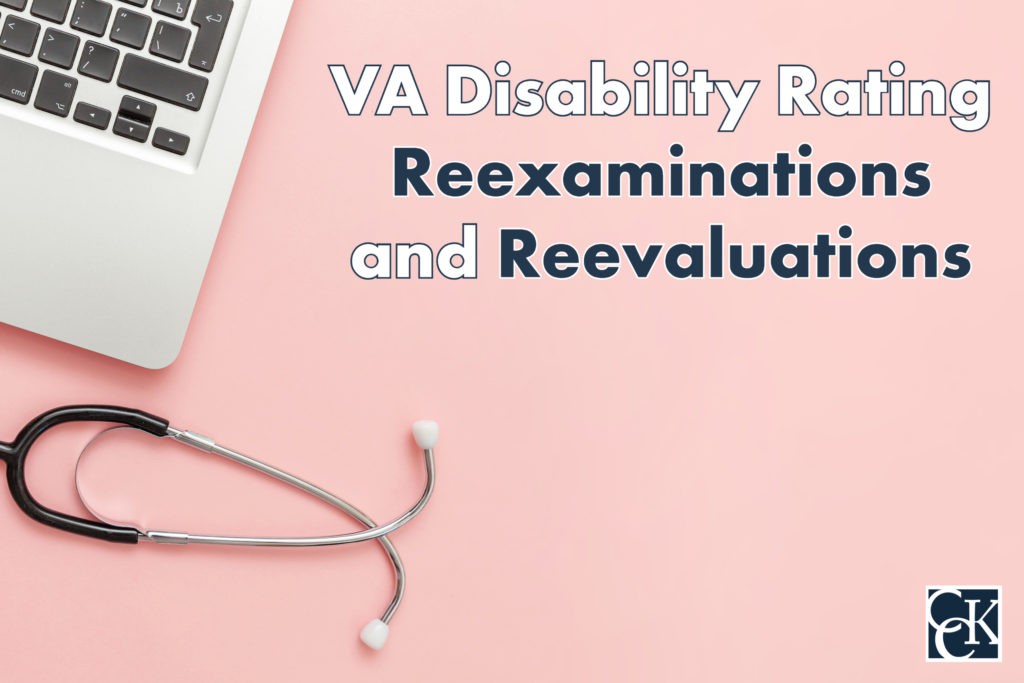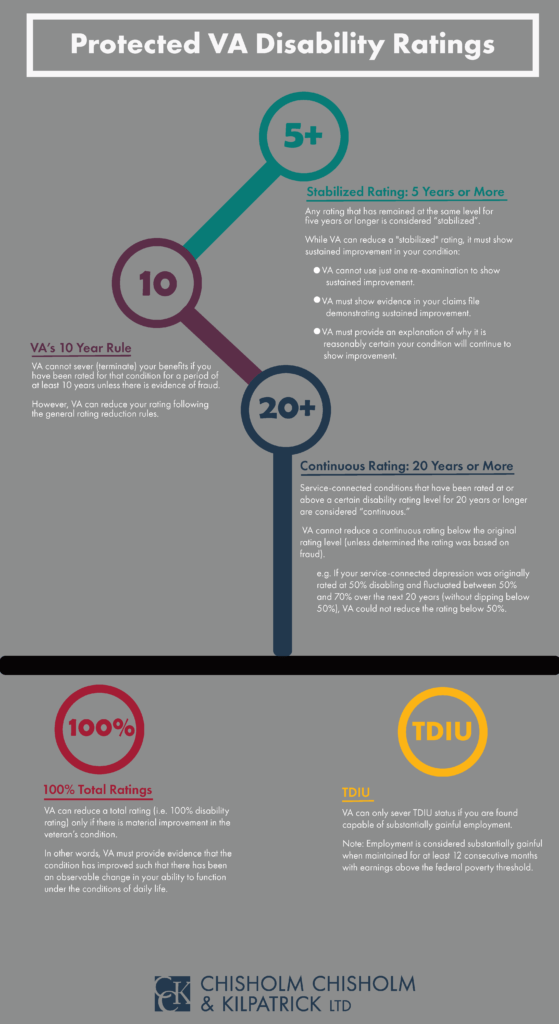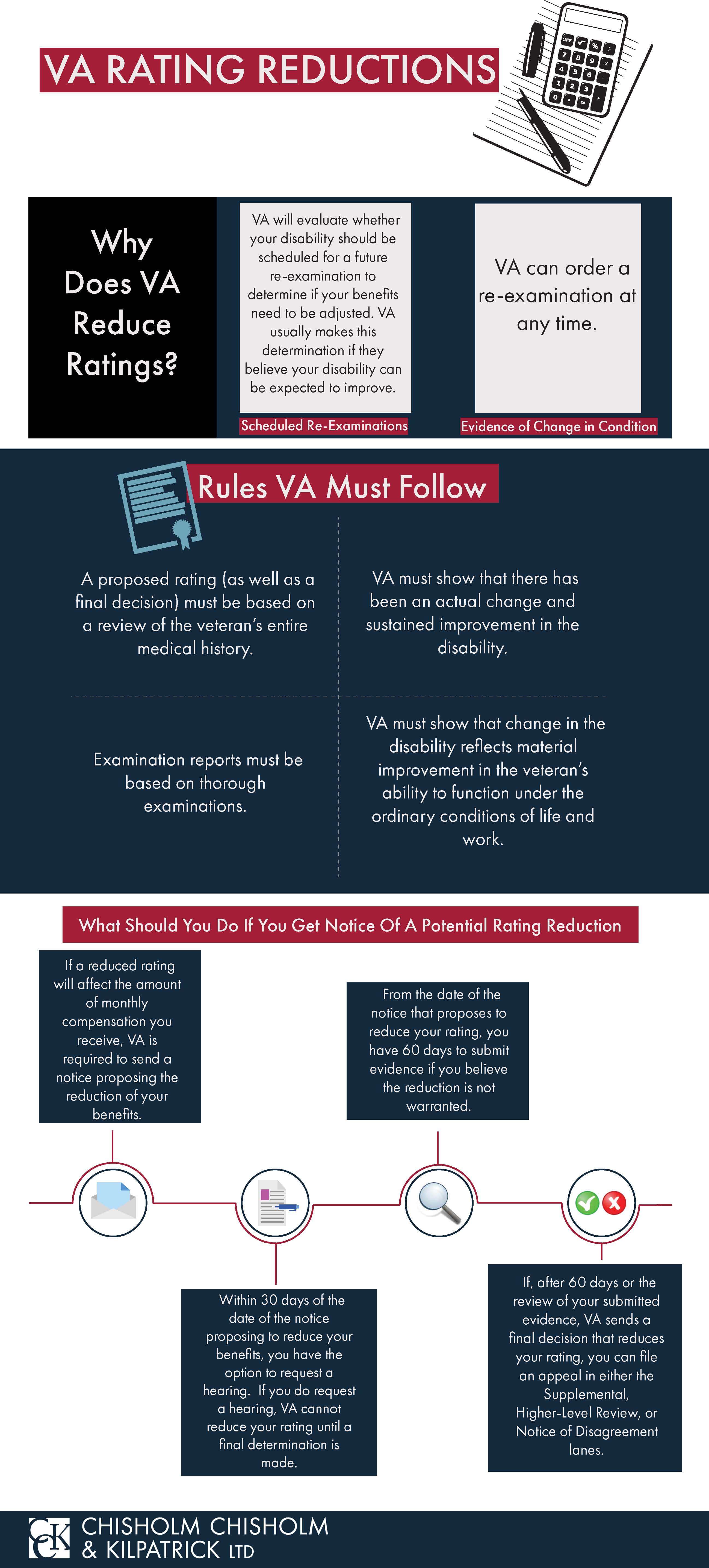VA Disability Rating Reexaminations and Reevaluations

CCK Law: Our Vital Role in Veterans Law
What is VA Disability Rating Reexamination?
A VA disability reexamination is a medical examination used to re-evaluate the severity of your service-connected disability. After you are initially awarded disability benefits, VA will evaluate whether your disability is such that you ought to be scheduled for a future examination to determine if your benefits need to be adjusted.
How Does VA Notify Veterans of a Reexamination?
VA is required to send veterans advance notice of the need for a reexamination. Typically, VA will call a veteran or send a letter to let them know that the reexamination has been scheduled. When VA schedules you for a reexamination, it is imperative that you attend.
If you do not attend the reexamination, you risk getting your disability benefits reduced. If you are unable to attend the reexamination, it is important that you notify VA as soon as possible. In this case, VA will likely work with the veteran to re-schedule the reexamination without any penalty to the veteran.

When Are Veterans Protected from Reexaminations?
According to 38 CFR § 3.327, no periodic reexamination will be scheduled in service-connected cases when:
- The disability is established as static;
- When the findings and symptoms are shown to have persisted without material improvement for a period of 5 years or more;
- Other protected VA ratings;
- Where the disability from disease is permanent in character and of such nature that there is no likelihood of improvement;
- In cases of veterans over 55 years of age, except under unusual circumstances;
- When the rating is a prescribed scheduled minimum rating; or
- Where a disability evaluation would not be affected if the future examination should result in reduced evaluation for one or more condition.
What is VA Disability Rating Reevaluation?
The purpose of reevaluation is to verify either the continued existence and/or the current severity of a service-connected condition. Essentially, reevaluations are conducted to ensure that the veteran is receiving a rating consistent with the severity of their disability.
How Often Does VA Reevaluate Ratings?
VA usually reevaluates veterans’ service-connected disabilities on two occasions:
- Six months after leaving military service; and
- Between two and five years from the date of the decision to grant VA disability benefits.
It is important to note that some ratings are protected from reevaluation, as well as reduction.
Generally, rating protections begin after a veteran is:
- Rated at the same level for five years or more
- Rated for 10 years
- Rated for 20 years above a certain rating
- Over 55 years of age
Why Would VA Reevaluate My Rating?
VA will require reevaluation in cases where it is likely that a veteran’s disability has improved, such that there is evidence indicating there has been a material change in a disability or that the current rating percentage is incorrect. An example of this would be if a veteran’s service-connected cancer goes into remission.
If there is a significant improvement to the veteran’s health upon reexamination, VA may choose to assign a lower disability rating, thereby lowering the amount of monthly compensation the veteran receives. VA may also determine that a disease or disability no longer exists, and thereby discontinue benefits.
VA Disability Reevaluation or Reexamination Timeline
- VA is required to send a letter proposing the reduction of your benefits if the decrease in your disability rating will affect the amount of monthly compensation you receive.
- The letter is not a final VA decision, so it cannot be appealed, but VA is required to give you the opportunity to respond to the proposal by submitting evidence and/or attending a hearing.
- From the date of VA’s letter, you have 60 days to submit evidence if you believe the reduction is not warranted.
- Within the first 30 days of the 60-day period, you also have the option to request a hearing to be conducted by VA personnel unrelated to the proposed reduction. VA must consider evidence you submit during this period along with all previous evidence and medical records associated with your file.
- After 60 days or after the review of your submitted evidence, VA will send a final decision. If the decision reduces your rating, you can file an appeal.
- Three appeal lanes to choose from:
- File a Supplemental Claim
- Request a Higher-Level Review
- File a Notice of Disagreement (Board of Veterans Appeals Dockets)
- Three appeal lanes to choose from:

Results of VA Reexaminations and How to Respond
There are several potential outcomes of a VA reexamination. Specifically, VA may find that your condition has worsened and as a result, your disability rating may be increased. VA can also determine that there is no change in your service-connected condition. In this case, your disability rating would not be reduced and therefore your monthly compensation amount would remain the same. However, VA might find that your service-connected condition has improved, in which case your disability rating may be reduced.
If the results of the VA reexamination are unfavorable, meaning VA found that the service-connected condition has improved, veterans have the right to challenge the results. Here, veterans can get an outside medical opinion from a private physician or healthcare provider. Additionally, veterans can submit lay statements outlining the onset, progression, and severity of their condition. Finally, veterans can write a letter to VA explaining why the examination provided was inadequate, if applicable.
VA Disability Rating Reductions
Under certain conditions, VA may reduce your disability rating. Legally, VA is allowed to reduce ratings so long as it follows specific rules. The idea behind rating reductions is that some service-connected conditions will improve over time or with treatment.
As such, VA wants to ensure it is compensating each veteran according to their present level of disability. VA normally starts the process of reducing a rating under two circumstances: (1) scheduled reexaminations and (2) evidence of change in condition.

VA Issued Thousands of Unwarranted Reexaminations
In July 2018, the Office of Inspector General (OIG) released a report that found that VA conducts thousands of unnecessary medical examinations for disabled veterans, and is on track to spend more than $100 million over the next five years on these unwarranted reexaminations if nothing changes. The OIG looked at a sample of 300 cases with reexaminations throughout a six-month period (March 2017 to August 2017) and found that VBA employees “requested unwarranted medical reexaminations in 111 cases,” approximately a third of the cases OIG selected for sampling. When looking at the data further, OIG stated that VBA employees requested reexaminations for veterans who were supposed to be excluded from reexaminations for the reasons explained above.
By failing to properly assess if reexaminations were warranted, OIG estimated that “VBA requested 19,800 veterans to report for unwarranted reexaminations during the review period.” OIG also found that approximately 14,200 of the 19,800 veterans did not have their disability evaluations changed following the reexaminations, and 3,700 veterans received VA proposals to reduce their disability benefits, even though they were not supposed to be reexamined in the first place.
Since then, VA has been working to implement the OIG’s recommendations to set up internal controls ensuring that reexaminations are appropriate before ordering them, and designing and implementing a system to minimize unwarranted reexaminations.
Contact Chisholm Chisholm & Kilpatrick LTD Today
If your VA disability claim has been denied, the experienced veterans’ disability attorneys at Chisholm Chisholm & Kilpatrick LTD are here to help. Contact us today at 800-544-9144 for a free consultation.
About the Author
Share this Post


